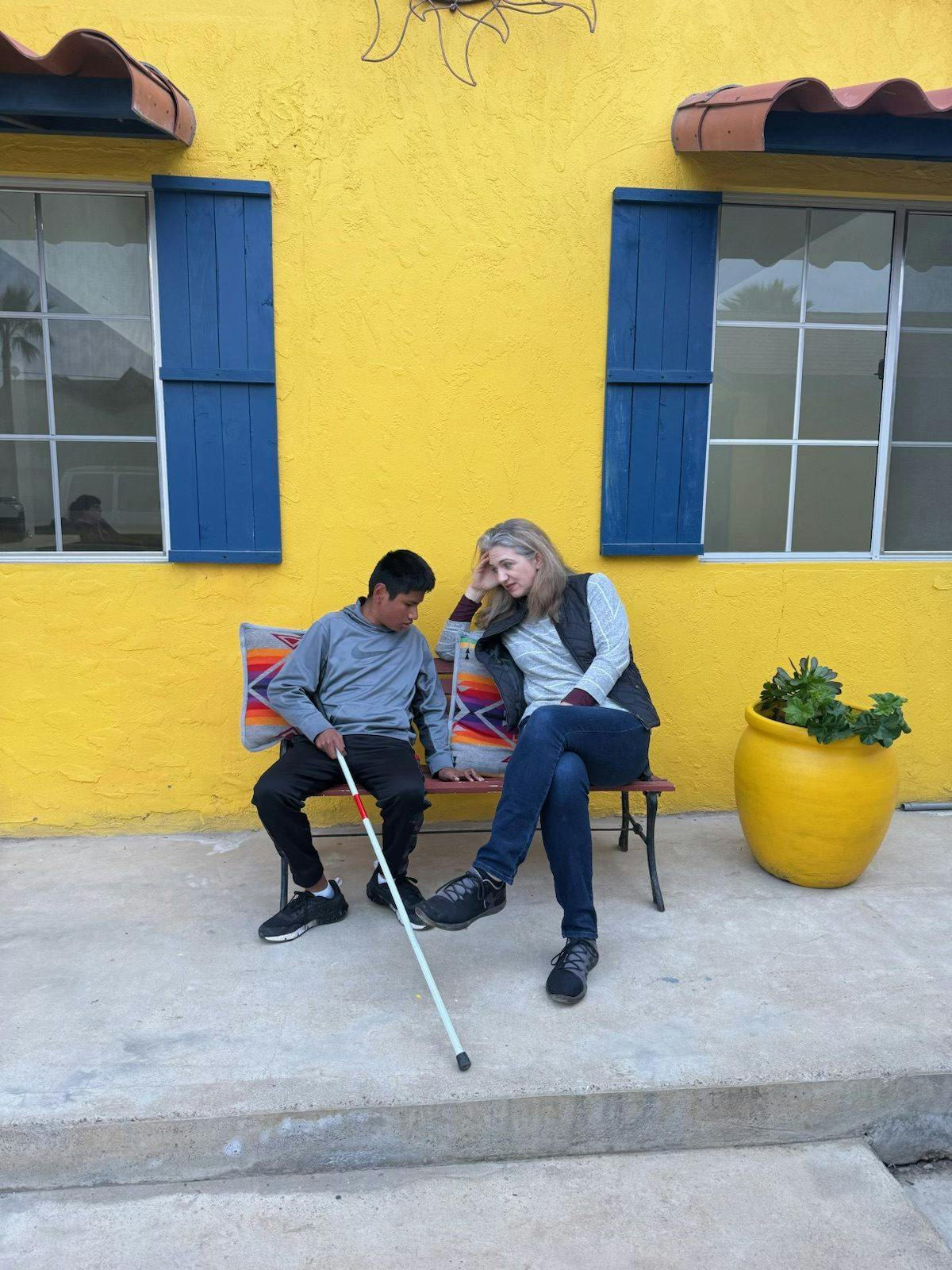Nicole Zinn’s four children are all adults now, but as Zinn’s kids were growing up, the family traveled to Mexico almost every year to be part of the work of Ancla Eterna, or Eternal Anchor, a ministry that serves children and adults with disabilities.
Zinn’s oldest son, Tillman, was born with intellectual disabilities, cerebral palsy, and autism, so it was natural for the family to understand the importance of Eternal Anchor’s ministry.
“Eternal Anchor is a very special place for my family,” said Zinn, who earned a master’s degree in theology from Seattle Pacific’s Seminary in 2023. “Eternal Anchor is this place where we see God’s people at the forefront of addressing the needs of people with disabilities, and it’s happening in this place where there’s a complete dearth of resources for that.”
Founded 10 years ago in the San Quintin Valley on the Baja Peninsula, the organization opened a residential home and then a school for children with disabilities. They also offer therapies: physical, occupational, and speech; mobility equipment; vocational training; and social groups for adults.
“In most cases, it is the only such service provider between Tijuana, five hours to the north, and La Paz, 12 hours to the south,” Zinn said.
After a visit to Eternal Anchor one year, Zinn wrote in a blog post: “It means entire families encounter — many for the first time – the inimitable, unmistakable love of Jesus. A love that breaks through barriers of cultural prejudices, that prizes the weak, that spends itself on behalf of others, that always trusts, always hopes, always perseveres.

In 2016, the Zinn family visited Rosario, a mother of seven, who described what life had been like for her son Angel. Angel shared the same diagnoses as Tillman — right-side cerebral palsy and autism.
Zinn looked over at Tillman’s twin sister, Celeste. Tears were streaming from her eyes as Rosario described the stigma, shame, and isolation Angel encountered before Eternal Anchor began working in the community.
“I will never forget the look on my daughter’s face when she realized for the first time that her brother would not have had access to public school if he had been born there; that he would have spent his life isolated,” Zinn said.
Zinn joined the board for Eternal Anchor a few years ago and later enrolled in Seattle Pacific Seminary’s theology program. Her involvement in each informed the other. Last year, she spent the winter months in Mexico, working at Eternal Anchor while she did online classes toward her master’s degree in theology from Seattle Pacific Seminary.
It was a long immersion into Eternal Anchor’s work — something Zinn says she would not have been able to do without Emeritus Professor Richard Steele’s class on Ministry to and with Disabled Persons and Their Families.
“All through Till’s growing up years, conversations around disability were something I was able to engage with for a little while, and then I had to pull way back because it was so intensely personal to me. I just couldn’t navigate those spaces for too long.
“God worked such a profound healing in me through Dr. Steele’s class. That class gave me the space to wrestle with things, and Dr. Steele provided the environment that really facilitated a significant healing for me,” Zinn said. “We read different works that were written by those with disabilities who were wrestling very honestly with God and staying in a space of faithfulness — in really tender and honest kinds of spaces. Those writers were mentors to me.”

Katie Douglass, associate professor of educational ministry and practical theology says that Zinn creatively used the seminary’s online courses to create her own ‘study abroad’ to work with Eternal Anchor while she continued as a graduate student at the seminary. “She was able to learn in context while remaining part of our community at Seattle Pacific Seminary, enriching both communities,” Douglass said.
Zinn chose to focus on reconciliation and intercultural studies as her areas of concentration in seminary. The program helped her develop insights into the inherent power dynamics between donors and recipients, especially across international and cultural lines, and this has shaped her ongoing work with donors in her role on Eternal Anchor’s board.
It’s common for donors to think gifts flow in just one direction and for beneficiaries to lack agency and voice. As a result of Zinn’s seminary work, she’s intentionally looked for ways to build genuine relationships between Eternal Anchor donors and communities in Mexico.
Zinn has also sought out opportunities to elevate the voices of people in the communities. For example, for Advent, Eternal Anchor students created simple, daily devotionals where they read Scripture and offered prayers — in some cases in Mexican Sign Language. The devotions were recorded and shared with the organization’s international community.
“The pride on the faces of those students when they delivered their parts fed my soul for weeks,” Zinn wrote in an email to several seminary professors.
Interested in Seattle Pacific Seminary’s programs? Find out more about SPS here.




